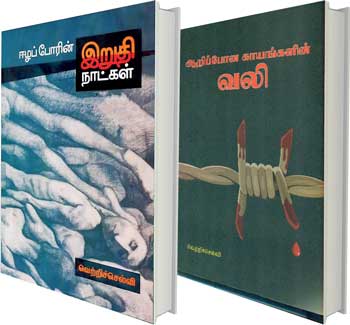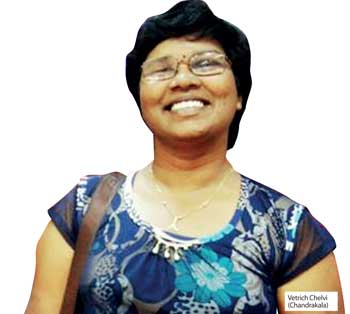Reply To:
Name - Reply Comment
Last Updated : 2024-04-20 00:00:00
A woman Tiger cadre recalls memories of the final days of Mullivaikkal before the security forces exploded into action
 “Single Death is a Tragedy; a Million Deaths is a Statistic.”
“Single Death is a Tragedy; a Million Deaths is a Statistic.”
This atrocious, but pathetically true statement has been ascribed to the longest serving President of the now defunct Union of Soviet Socialist Republics (USSR), Joseph Stalin.
The statement is perfectly true in the eyes of the people in the southern parts of this country in respect of what happened in the battlefront during the final few weeks of the war between Government security forces and the Liberation Tigers of Tamil Eelam (LTTE).
We now know that more than three hundred thousand people had been entrapped in an area less than one square kilometre in the littoral of Mullivaikkal in the Mullaitivu District during those final days of the war. All three hundred thousand men, women and children undeniably must have had three hundred thousand harrowing tales to tell.
They were caught in between the security forces and the LTTE, which too had an army, navy and an air force then, but desperately using the civilians as a human shield, while being on the run in May, 2009. But, as stated by Stalin we know only the diverse statistics of people trapped, killed wounded and maimed in the war- the statistics put forward by various people, according to their political affiliations and agendas of their organisations.
hapless people
But, we don’t know how these hapless people under siege escaped from the many showers of flying bullets fired by both sides and the shrapnel of bombs and shells exploded amidst them. Neither do we know how they were forced out from their homes to be ensnared between warring parties, what they ate, fed their children, how they carried their elderly and critically wounded loved ones from place to place for safety during that tormenting entrapment, nor do we know how they broke the LTTE siege finally in order to enter into the areas held by the security forces or their first encounter after that with those forces.

It’s only a well versed person in story telling who was also unfortunate to be an eye-witness of this horrendous battlefield who would be able to visualize in us, the horrible picture of the nerve-racking situation in Mullivaikkal. Velu Chandrakala, an LTTE woman cadre who surrendered to the Army at Mullivaikkal, three days before the security forces sealed victory, is no doubt qualified to relate to us that traumatic and pathetic story. She had fought for 18 long years for a separate Tamil State, losing an eye and a hand in an explosion, before she dissociated with her gun and the cyanide capsule.
Chandrakala who had been given the nom de guerre “Vetrich Chelvi” by the LTTE provides a graphic detail of the situation during those hellish few days in her book titled “Eelap Porin Iruthi Natkal” (Last Days of Eelam War). She seems to have acquired her captivating language evinced in the book by working as a journalist for the “Suthanthira Paravaikal” newspaper and as an announcer of the Puligalin Kural Radio, two media arms of the LTTE.
It was a story of the hell. It was the story of around three hundred thousand unarmed civilians from four districts, Mannar, Vavuniya, Mullaitivu and Kilinochchi who had been restricted within a small area which during the final week of the war. This place is said to have been shrunk to the size of about two football grounds!
Also it was a war between a ruthless rebel group on the wane which was moving among the besieged people and three armed forces launching attacks with similar ferocity, from the land, sea and the sky. The armed forces had been determined to destroy the enemy, at the first ever opportunity that came their way during the past three decades.
Horror summarised
Vetrich Chelvi summarises the horror people were facing in one simple paragraph, but in a sensitive way. “The body of a young child in the cradle would be blown into pieces, the hand that reaches the mouth with a piece of bread would be severed off instantly by a flying shrapnel, a small girl running to take shelter in a bunker would lose her leg with a thundering bang. In every minute human organs were being severed away”
What was revealed just now isn’t from a frame of a horror movie or a page from a novel. This was a real time plight that was undergone by a group of human beings in this country some eight years ago. She further explains, “No family was without a story of a death. Not a second passed without wails and cries around. Everybody was hit. All men, women and children struggled to endure pain. All were on the move with no aim, irrespective of them being combatants or civilians. Anybody who wished to relax for a moment had to lose either life or limbs.”
Being a trained combatant of the LTTE, Vetri as her friends called her, explains in the book how the battlefront situation changed in favour of the armed forces and how the people reacted to it. She first tells about her organisation’s heyday. “Any military thrust of any magnitude by the troops was defeated in a few hours or within a day. At the end of the battle the Liberation Tigers piled up hundreds of weapons and bodies of the army personnel in the Kilinochchi playground,” says Vetrich Chelvi. Then she relates how their fortune wore off. “The Armed forces attempting to breach the defences of the Tigers in all fronts first found their way into the Tiger held territory in the Western front. They advanced along the roads opened up in Mannar, Adampan, Pallikkuli and Madhu. Next, the Kilinochchi town began to quake by the thunders of the Kfirs. Hundreds of buildings were flattened by the bombs dropped by the Kfirs and MiG aircraft. Lives too charred with them. Not a single day passed without Eelanatham newspaper carrying stories of airstrikes…
On-the-job training
“Militant did not have sufficient time or places to train their new recruits. It was the real-time battlegrounds that became target practice ranges. It was on-the-job training. But they did not have their enemy within their sight to shoot. It was the rain of shells launched by the enemy that swept away the frontlines of the militants…
“People started to bitterly criticize the struggle when they had to face repeated defeats and losses. But they were not so unmoved not to refuse requests for blood for injured fighters. Their earnest passion and craving for the separate State had not been lost…They cursed the fighters who were involved in recruiting new combatants, but at the same time served those who returned exhausted from battlefront, with food,” reminisces Vetrich Chelvi.
No family was without a story of a death. Not a second passed without wails and cries around. Everybody was hit. All men, women and children struggled to endure pain. All were on the move with no aim, irrespective of them being combatants or civilians
Despite the cruelty that was present, people as well as the rebels had to sustain their lives, feed their loved ones, treat their seriously wounded family members and look after their elderly parents and grandparents while protecting all of them from the bullets and shrapnel chasing them helter-skelter. The author relates of a story of a fellow woman combatant who had to jump into the bunker four times while cooking a pot of rice on the fire nearby.
There had been one or two land phones still amazingly functioning in the battlefront and the LTTE had made them available to the people to relate their woes to friends and relatives living outside their cordoned off tiny world. But Vetrich Chelvi says the people waiting hours in long queues for telephone calls were always being dispersed by the killer shells that fell and exploded in close proximity to them, sometimes killing and injuring civilians and combatants.
The book, in a way, is an indictment against the LTTE for its presence among the civilians even when they were in the State declared safe zones. Though the LTTE’s presence might have invited shells from the armed forces into the areas occupied by the civilians, it also seems to have reduced the chaotic situation among the people, as the outfit had been organising the distribution of food, medical and other logistic facilities.
Cyanide capsule
Vetrich Chelvi was determined to bite her cyanide capsule in case of arrest by the armed forces or being forced to surrender during these decisive days. But she was in a quandary when the people started to move into the army held areas and it was clear that the army would reach them in about half an hour. The reaction by her colleagues to the people’s desertion of them and the army’s rapid approach was mixed with some being told to have bitten the “Kuppi,” as they called the cyanide capsule that was hung from their necks while the majority of them had chosen to go to the “enemy,” she said.

Vetrich Chelvi’s kuppi was removed by one of her aunts who took care of her during the final three days in Mullivaikkal, as the latter saw her touching it several times with each word about the approaching army.
Similar to Thamilini, the women’s Political Wing Leader of the LTTE explaining in her book, “Oru Koor Valin Nilalil” (under the shadow of a sharp sword) how she changed her mind before giving her up to the army, Vetri too finally deceives herself into justifying her decision to dissociate with her kuppi, gun and the uniform in order to mingle with the massive procession of civilians that was moving towards the army frontline. She explains the struggle that continued with her mind;
“Why should I surrender? What is the use of living any longer? Is anybody going to put up a stage and tell the world that this was how we died? Should we die only when people are to tell the world? My inner mind questioned. The answer was in the negative. But isn’t it going to be a death uninformed even to our parents? Deaths occur without their causes being unidentified in a war. But why should I die when there is no longer any war?
“Had I died before, it would have been a death of a heroine. Hereafter, it would be a murder or a suicide. The struggle within the mind was multifaceted. I was ambivalent”.
Finally a young boy who had been bringing them “news” from other bunkers guides them to face the reality. “Akka, have a change and get out of the place immediately. Don’t think about biting the “kuppi.” Even if you die there wouldn’t be anybody to tell that three people died this way,” the boys had reasoned.
He was correct. So many cadres of the outfit had died after biting the kuppi inside their bunkers, according to the boy. But except for that reference in Vetrich Chelvi’s book, all those deaths had gone unnoticed in the pandemonium that had prevailed.
double agents
Vetrich Chelvi explains her life in the welfare camp for women cadres in a separate book titled” “Aarip Pona Kaayangalin Vali” (The pain in healed wounds) which she had described as the part II of “Eelap Porin Iruthi Natkal.”
After her surrender to the army she was amazed to see several of her organization’s intelligence officers receiving the civilians coming into the army’s frontline, on behalf of the army and organizing transport and food for them. In fact, they had been army moles among Pottu Amman’s men. One such double agent among army personnel had even advised them in public to behave in a manner that should protect the “good name” of their organization.
She speaks of kind hearted men and women along with rude and racist people among the army personnel in welfare camps. She recalls a particular handsome youth among them who had fascinated her with his charming look as well as his respected and kind behaviour. He had called the people under the army custody “Akka” and “Anna” (brother) irrespective of some of them being LTTE cadres who had fought a bitter war with his colleagues, until a few days ago.
Vetrich Chelvi recalls another incident where the inmates of the LTTE women cadres were furious about a news item published in an Indian Tamil magazine that claimed that women in Sri Lankan welfare camps for northern Tamil civilians had been sexually molested by the soldiers. “In which camp had such incidents happened?” she contests in “Arip Pona Kayangalin Vali.”

Add comment
Comments will be edited (grammar, spelling and slang) and authorized at the discretion of Daily Mirror online. The website also has the right not to publish selected comments.
Reply To:
Name - Reply Comment
On March 26, a couple arriving from Thailand was arrested with 88 live animal
According to villagers from Naula-Moragolla out of 105 families 80 can afford
Is the situation in Sri Lanka so grim that locals harbour hope that they coul
A recent post on social media revealed that three purple-faced langurs near t